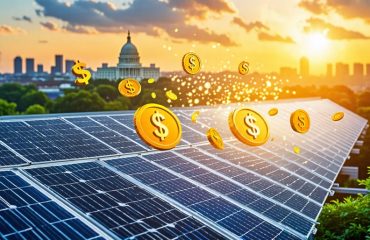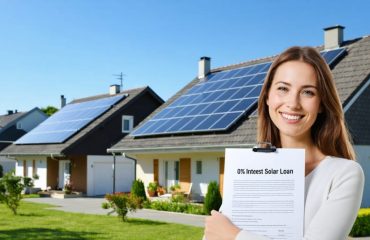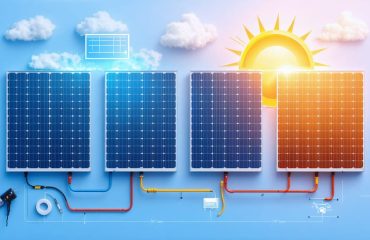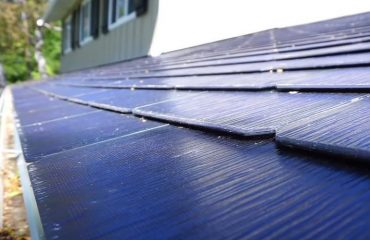Transform your solar project from concept to reality with innovative solar financing solutions that minimize upfront costs while maximizing long-term returns. Modern financing options have revolutionized how businesses and homeowners approach solar investments, making clean energy more accessible than ever before. From power purchase agreements (PPAs) that eliminate capital expenditure to specialized solar loans offering competitive rates, today’s financing landscape provides flexible pathways to solar adoption. Whether you’re a small business owner looking to reduce operating costs or a property developer seeking to enhance asset value, understanding these financing mechanisms is crucial for making informed decisions that align with your financial goals and sustainability objectives. The right financing structure can turn a solar installation from a capital burden into a strategic advantage, delivering immediate cost savings while building long-term energy independence.
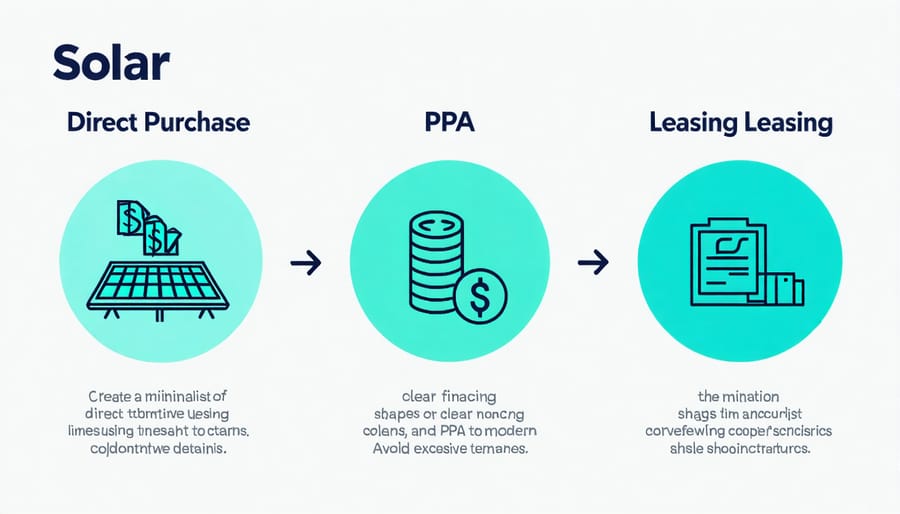
Popular Corporate Solar Financing Options
Direct Purchase
Direct cash purchase of a solar system offers the highest long-term savings and simplest ownership structure. When you buy your solar panels outright, you avoid interest payments and third-party ownership complications, allowing you to maximize your return on investment. Most homeowners who choose this option see complete payback within 5-8 years, after which they enjoy free electricity for the remainder of the system’s life.
The upfront cost typically ranges from $15,000 to $25,000 for an average home system, but federal tax credits and local incentives can significantly reduce this amount. Cash buyers also maintain full control over their system and can make decisions about maintenance and upgrades without consulting lending institutions or lease providers.
Additionally, direct ownership increases your property value immediately, with studies showing that homes with owned solar systems sell faster and at higher prices than those with leased systems. While the initial investment is substantial, the combination of eliminated electricity bills, tax benefits, and increased property value makes direct purchase an attractive option for homeowners with available capital.
Solar Power Purchase Agreements (PPAs)
A Solar Power Purchase Agreement (PPA) offers a straightforward way to go solar without the upfront costs of buying a system. Under this arrangement, a solar provider installs and maintains the solar panels on your property at no cost to you. In return, you agree to purchase the electricity generated by the system at a predetermined rate, typically lower than your current utility rates.
PPAs usually run for 15-25 years, during which you benefit from predictable electricity costs and protection against rising utility rates. The solar provider handles all maintenance, repairs, and system monitoring, ensuring optimal performance throughout the agreement term.
One of the main advantages of a PPA is immediate savings on your energy bills from day one. You’ll only pay for the power you use, and rates are often 10-30% lower than utility prices. Since the provider owns the system, they’re responsible for its performance and qualify for tax incentives and rebates, which are typically reflected in your lower electricity rates.
PPAs are particularly attractive for businesses and organizations that want to reduce their carbon footprint while maintaining their capital for core operations. At the end of the agreement, you usually have options to extend the PPA, buy the system at fair market value, or have it removed at no cost.
Solar Leasing for Businesses
Solar leasing offers businesses a practical way to adopt solar energy without significant upfront costs. Similar to leasing versus buying solar panels for homes, commercial solar leases typically span 15-25 years and include maintenance and monitoring services.
Under a solar lease agreement, businesses pay fixed monthly payments to use the solar energy system while the leasing company maintains ownership. This arrangement often includes performance guarantees, ensuring consistent energy production throughout the lease term. Many businesses appreciate that these payments are typically lower than their current utility bills, providing immediate cost savings.
The benefits extend beyond financial aspects. Leasing eliminates maintenance responsibilities, includes warranty protection, and allows businesses to showcase their commitment to sustainability without capital investment. Some leasing programs even offer buyout options at the end of the term, providing flexibility for long-term planning.
While tax incentives typically go to the system owner, lease payments are usually tax-deductible as operating expenses, offering businesses another financial advantage.
Financial Benefits and ROI
Tax Incentives and Rebates
Understanding available solar tax incentives can significantly reduce your solar project costs. The federal Investment Tax Credit (ITC) remains one of the most valuable benefits, allowing you to deduct 30% of your solar installation costs from your federal taxes through 2032. This incentive applies to both residential and commercial installations, making it a cornerstone of solar financing strategies.
Many states offer additional tax benefits and rebates that can stack with federal incentives. These may include property tax exemptions for the added home value from solar installations, sales tax exemptions on equipment purchases, and performance-based incentives that pay you for the energy your system produces.
Local utilities often provide rebates and performance incentives, while some municipalities offer grants or low-interest financing programs. Some areas also have Solar Renewable Energy Credits (SRECs) markets, where you can earn additional income by selling credits for the clean energy your system generates.
Remember to check with local solar installers or energy offices, as available incentives vary by location and can change periodically. Taking advantage of these programs can significantly improve your project’s return on investment.
Long-term Cost Savings
Investing in solar power delivers substantial financial benefits over time, with most homeowners seeing significant savings within the first few years. The average household can expect to reduce their monthly electricity bills by 50-90%, depending on their location and energy consumption patterns. These solar investment returns typically result in complete system payback within 5-8 years.
Beyond the immediate reduction in utility bills, solar installations offer protection against rising electricity rates, which historically increase by about 2.2% annually. Over a 25-year period, the typical homeowner can save between $20,000 and $50,000 on energy costs, accounting for inflation and utility rate increases.
The savings are further enhanced by reduced maintenance costs, as modern solar systems require minimal upkeep. Additionally, many states offer performance-based incentives that pay homeowners for the energy their systems produce, creating an ongoing revenue stream. When combined with increased property values and potential tax benefits, the long-term financial advantages of solar investment become even more compelling.
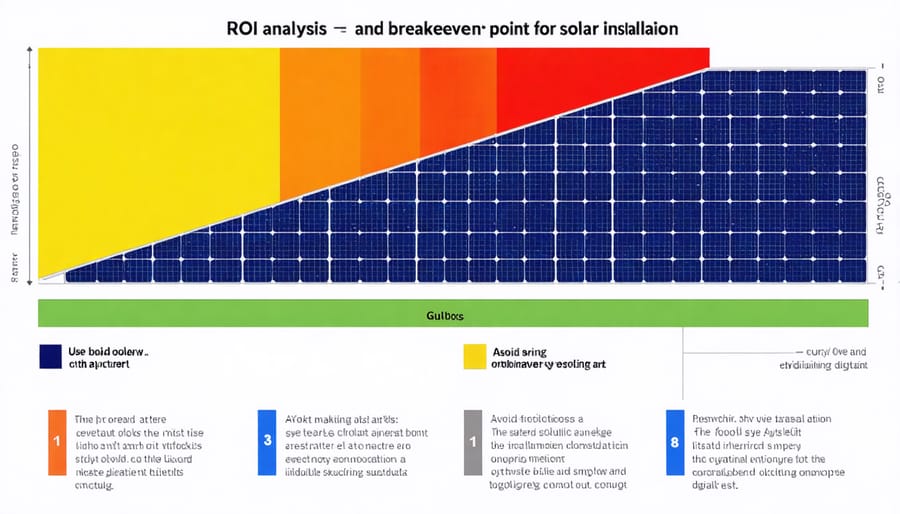
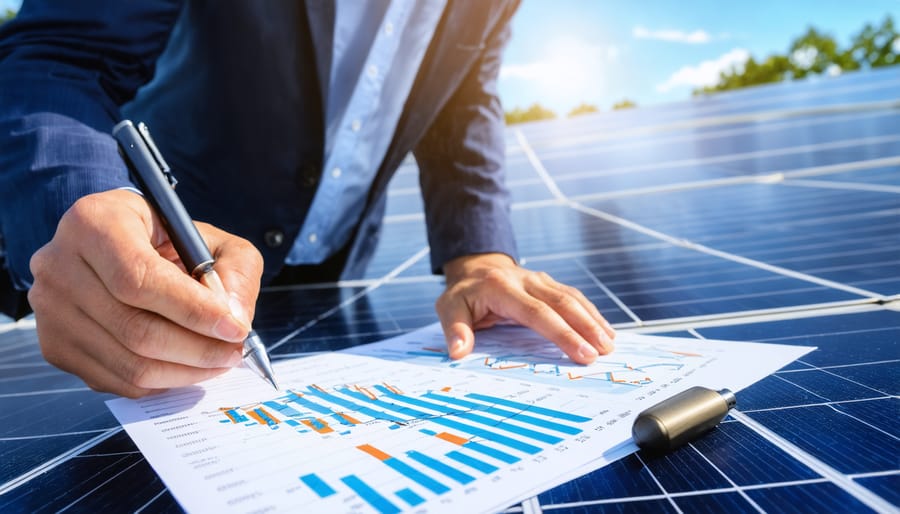
Choosing the Right Financing Model
Company Size and Energy Needs
The size of your business and its energy consumption patterns play crucial roles in determining the most suitable solar financing option. Larger companies with substantial energy needs and strong credit ratings often benefit from power purchase agreements (PPAs) or direct purchases, as they can leverage their scale for better terms. These organizations typically have the resources to handle larger upfront costs or qualify for favorable financing rates.
Mid-sized businesses might find solar leases or commercial PACE financing more appropriate, as these options require less initial capital while still providing significant energy savings. Small businesses with moderate energy needs could benefit most from solar loans or equipment financing, which offer more flexibility and manageable monthly payments.
Consider your average monthly electricity bills, available roof or ground space, and long-term business plans when evaluating financing options. A company using 50,000 kWh monthly will have different financing needs than one using 5,000 kWh, affecting both the system size and optimal funding approach.
Budget and Timeline Considerations
Planning your solar project’s budget and timeline requires careful consideration of several key factors. Most residential solar installations take between 2-3 months from signed contract to completion, though this can vary based on local permitting processes and installer availability.
The upfront costs typically range from $15,000 to $25,000 for an average home system, before incentives and tax credits. However, federal tax credits can reduce this by 30%, and state or local incentives may offer additional savings. Many homeowners see a return on investment within 5-8 years through reduced electricity bills.
Your timeline should account for:
– Initial consultation and site assessment (1-2 weeks)
– Design and contract finalization (1-2 weeks)
– Permit acquisition (2-4 weeks)
– Installation (1-3 days)
– Final inspection and utility connection (1-2 weeks)
Remember to factor in seasonal considerations, as some regions experience installation delays during winter months or peak summer demand.
Solar project financing has become increasingly accessible and versatile, offering homeowners and businesses multiple paths to harness clean energy while managing costs effectively. Whether through solar loans, power purchase agreements, or lease arrangements, there’s a financing solution to match nearly every budget and goal. The key is to carefully evaluate your energy needs, financial situation, and long-term objectives before selecting a financing option.
Remember that local incentives, federal tax credits, and varying electricity rates can significantly impact your decision. Take time to compare different financing options, obtain multiple quotes, and read through contracts thoroughly. Consider consulting with financial advisors and solar experts who can provide personalized guidance based on your specific circumstances.
By making an informed decision about solar financing today, you’re not just investing in your property – you’re contributing to a sustainable future while potentially saving thousands on energy costs. With the solar industry continuing to evolve and financing options becoming more innovative, there’s never been a better time to explore solar energy for your home or business.


